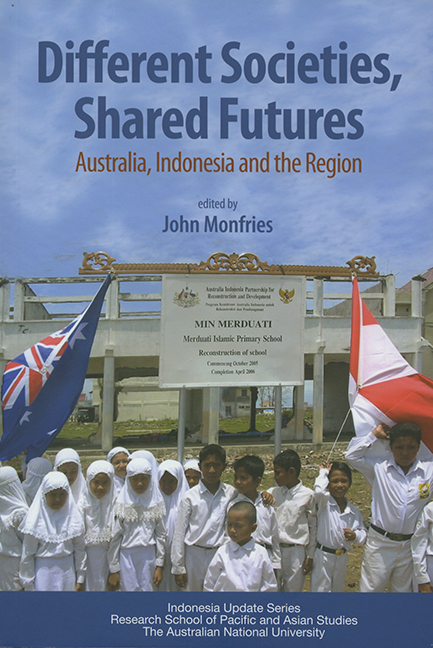Book contents
- Frontmatter
- Dedication
- Contents
- Tables
- Figures
- Contributors
- Acknowledgments
- Opening Address by Richard Woolcott AC
- 1 Introduction
- PART I Regional Viewpoints
- PART II Security Aspects
- PART III Mutual Perceptions and Irritations
- PART IV The Economic Partnership: Aid, Economics and Business
- PART V Conclusion
- 13 Reflections on the Bilateral Relationship – and Beyond
- Glossary
- References
- Index
13 - Reflections on the Bilateral Relationship – and Beyond
from PART V - Conclusion
Published online by Cambridge University Press: 21 October 2015
- Frontmatter
- Dedication
- Contents
- Tables
- Figures
- Contributors
- Acknowledgments
- Opening Address by Richard Woolcott AC
- 1 Introduction
- PART I Regional Viewpoints
- PART II Security Aspects
- PART III Mutual Perceptions and Irritations
- PART IV The Economic Partnership: Aid, Economics and Business
- PART V Conclusion
- 13 Reflections on the Bilateral Relationship – and Beyond
- Glossary
- References
- Index
Summary
In a year when relations between Australia and Indonesia have taken a more encouraging turn for the better than we have seen in nearly a decade, it is worth highlighting a notable feature of the 2005 Update conference, on which this book is based. It has been one of the most well-informed and penetrating discussions of the relationship I have heard during the 60 years since our two countries first had to start thinking about how to become good neighbours as well as independent members of our post-colonial region. All of the papers have provided frank, realistic assessments of the many problems that might obstruct such admirable intentions, instead of the bland platitudes we so often hear about the importance of friendship and cooperation between us, which no one of good sense would want to dispute. While all of the speakers share the hope that cordial relations between our two countries can be maintained and strengthened, they are well aware that this may prove very difficult. It will require better-targeted efforts on both sides to keep the bilateral relationship in good shape than we have seen hitherto. That is a problem I will return to in due course.
Australia's unprecedentedly generous and prompt response to the tsunami disaster in Aceh at the end of 2004 could turn out to be a major step forward in the development of a stronger bilateral relationship, especially as it has been reinforced by the cordial personal relations developed by Prime Minister John Howard and Indonesia's new president, Susilo Bambang Yudhoyono (SBY), since October 2004. Conversely, the support Indonesia gave Australia to help ease its entry into the all-important East Asia Summit in December 2005 is a good omen for the future, for the latter could turn out to be one of the most significant landmarks in our 60-year saga of trying to find an appropriate basis for Australia's acceptance into and participation in the political councils of the region. Any reservations by Jakarta could have wrecked Australia's chances of gaining acceptance there.
- Type
- Chapter
- Information
- Different Societies, Shared FuturesAustralia, Indonesia and the Region, pp. 171 - 184Publisher: ISEAS–Yusof Ishak InstitutePrint publication year: 2006

